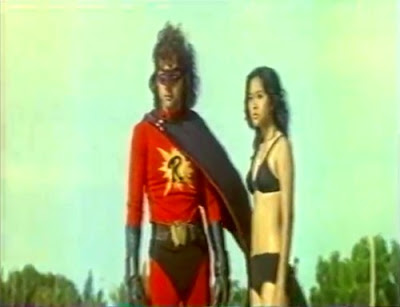Karl over at the fabulous
Fist of B List blog has kindly invited me, along with the rest of the members of
M.O.S.S., to participate in his “Ninjavember” blog roundtable. I enthusiastically agreed, despite my feeling that ninjas, like zombies, have become sort of a generic cultural commodity—a faceless, insensate enemy seemingly readymade for wholesale, video game style slaughter—or, even worse, a lazy shorthand for a snarky kind of pop culture knowingness. Still—hey, ninjas!
I chose to write about
Ölüm Savasçisi, a Turkish ninja film, because I
thought that it would provide a welcome departure from all the Godfrey Ho Franken-ninja films that my co-hosting duties at the
Taiwan Noir podcast have necessitated my familiarity with. Instead it turned out to be so similar to those films that it could almost be considered a Turkish remake of
Ninja Thunderbolt, seeing as it largely consists of context-free fight scenes loosely held together by a lot of haphazardly assembled footage from other movies. In short, it is complete nonsense, albeit a very particular
brand of nonsense.
I struggled to find a word to describe the editing rhythms of
Ölüm Savasçisi. I finally settled upon “narcoleptic”, because watching it is like falling asleep in front of the TV and periodically waking up for 2-5 seconds at a time. Occasionally you will wake up to find that you are watching a scene from a James Bond movie and think, “Boy, I must have been asleep longer than I thought”—until you realize that that scene has been randomly inserted into
Ölüm Savasçisi by its copyright flaunting producers. The best example of this is the film’s employment of the car chase from
Diamonds Are Forever, which climaxes with two obvious toy cars being rammed together in front of a backdrop that looks like it was drawn with a magic marker.
Despite all of this,
Ölüm Savasçisi differs from all of those Godfrey Ho movies in one very significant way, in that, rather than Richard Harrison, it stars
Cuneyt Arkin, who essentially plays in it the pinnacle of Turkish manhood. This is usually the case with Arkin, of course, but here his innately Turkish awesomeness is put in especially stark relief by placing
Ölüm Savasçisi’s action in an unnamed country with the grave misfortune of not being Turkey. Let’s call it Wimpistan, or Pussylvania.
This bloodless little country is being plagued by a series of ninja-style murders, and the only man for the case is Turkish police inspector Murat (Arkin), who must be roused from a Speedo-clad lakeside idyll with a bikini wearing honey to make the trip to Sissytopia. Murat, you see, has dealt with the ninja before and knows their ways. For the crazed Ninja cult that is responsible for the murders, this is a positive development, for it was the exact intent of their leader (Osman Betin) to draw Murat out so that he may exact upon him his vengeance for something or other. And so the wall-to-wall fighting that it is our divine right to expect from Turkish exploitation cinema begins.
Ölüm Savasçisi can be called many things, but a suspense film it is not. Murat so handily defeats all of his opponents that its outcome is as certain as sweet death itself. If there can be said to be any kind of real conflict in the movie, it is that between Murat and the police officials of Lameovia, who resent him hanging around and making them look weak and indecisive all the time (“What kind of man is he?” one asks, prior to meeting him. “Extremely honest, like all Turks,” comes the reply.) Time and again, they try to send him packing, only to have some new crisis come up for which he is needed. Finally, when the ninjas kidnap the country’s fat, sniveling president, Murat tears off on his motorcycle with a comely cult defector (Funda Firat) to lay siege to their mountain hideout.
Amidst the above described action, odd supernatural elements pop up throughout
Ölüm Savasçisi like profanities from a Tourette’s sufferer’s mouth. A man is eaten by a hedge, and a zombie with a face covered in shaving cream rises from an autopsy table. Neither of these events is mentioned again. Elsewhere, much use is made of the careening “demon cam” effect from Sam Raimi’s
Evil Dead, in one scene culminating with a ninja bursting up from out of the ground. Oh, and the evil cult leader can levitate rocks and turn them into incendiary bombs.
My wife watched a few minutes of
Ölüm Savasçisi with me and opined that it was terrible. She was, and is, right. But it is terrible in the best kind of way. If you just want your brain wallpapered with eighty minutes of Cuneyt Arkin karate-ing ninjas into agonized heaps of human suffering, it is, in fact, a perfect movie. Because, hey, fuck those ninjas.




































































































